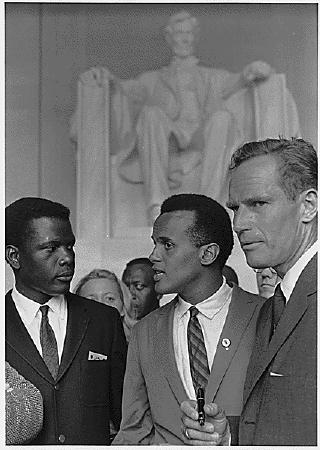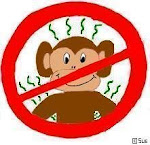Charlton Heston stands with Sidney Poitier and Harry Belafonte after March on Washington. 
July 23, 2001--The legendary Ziegfield Movie Theatre in New York City, my friend Bob and I were standing along the ropes of the red carpet for the premiere of the remake of Planet of the Apes. We took photos and watched as stars like Mark Wahlberg, Paul Giamatti and Helena Bonham Carter passed by, but we were both psyched to see a cast member who had a small role in the new film--Charlton Heston.
Heston was 77 then and a little shaky, but he looked happy there with his wife of 60+ years and college sweetheart, Lydia. A year later we would find out he had Alzheimer's, but that night was something special for Heston and especially for Bob and I. That was the only time either of us would ever see the man. We grew up watching and loving the Planet of the Apes (POTA) series and became Huge fans of its original star Heston. In the film he was as comfortable giving dense speeches as written by Twilight Zone's Rod Serling, as performing the half-naked stunts and showing anger, fear, tenderness and unyielding strength. I can't imagine another actor having the skills to fulfill the role of Taylor. Because of that part and that film, until I was about 20 years old, Charlton Heston was my favorite actor. I caught as many movies as I could of the man in that pre-video era.
Nearly 7 years later, Bob calls me and tells me that the Ziegfield will be holding a retrospective in honor POTA's 40th Anniversary. On March 29th, we go to see POTA on a big screen for the first time in our adult lives. We were surrounded by about 100 die-hard Ape fans and we chatted with them for about 20 minutes before the show started. We discussed several different things, but one subject that came up was Heston's failing health. Why do so many great minds fall to Alzheimer's? We put those thoughts away as we enjoyed the majesty of the film. It was my 2nd time seeing POTA in a theatre, Bob's 3rd. But just one week later, on the morning of April 6th, Bob calls to tell me that Charlton Heston had died. Very sad, but it had to be a relief to him and his family. You can't live a fuller life than he did.
My second favorite Heston film is The Ten Commandments. I've seen it only a few times less than POTA. The physical transformation that he goes through in that film is similar to the one he goes through in POTA, until the burning bush and his white mane come along. As a youngster, I never thought about the fact that this tall, blond WASP would play the leader of the Jews. He seemed perfectly cast for the part and I have yet to see another Moses who is as regal. Some of his roles were great, like in Ben-Hur, The Big Country, as John the Baptist in The Greatest Story Ever Told, Soylent Green and Major Dundee. Some were just so-so like in: The Greatest Show on Earth, Touch of Evil, Earthquake, Midway and Airport 1975. But he was never boring.
However, when I turned 20 in 1986 I had become a serious movie fan and when I watched other actors I found Heston to be a bit hammy. But his hamminess was part of that old-school approach to acting that started to disappear a few years after Heston had established himself. Though only 1 year older than Marlon Brando, their acting styles were generations apart. Heston was brought up in the theatrical tradition of acting that had dominated film for its first 50 years. The overacting and precise diction that bore little resemblance to real life. Brando was from the new school of method actors that paused and slurred their words to bring more realism to the screen. While Brando's style became the dominant form for the next 50 years of filmmaking, there was obviously still a strong call for Heston's style because he was the Top Box Office star of the '50s, '60s and early '70s.
By the time he made Planet of the Apes in 1967, he was king in the cinema world. Already an Oscar winner for Best Actor for Ben Hur and star of two Best Picture winners. For such a big star and serious actor to take part in a science fiction film was unheard of at the time. It was a risk, but one that paid off handsomely. From what I hear, Heston had such faith in the film's success that he took less money up front for a bigger percentage of the film's profits. It made $33 Million in just the US in 1968, an incredible amount for the time. Along with 2001-A Space Odyssey, Planet of the Apes ushered in a new era of serious science fiction filmmaking which would eventually culminate in Close Encounters and Star Wars nine years later.
His role in the new POTA in 2001 was a throwaway part that was more camp than serious acting. The whole movie was a big letdown after 30 years of praying for a new film by its legions of fans. Actually, my favorite acting jobs by Heston in the last 15 years were in True Lies as Arnold Schwarzenegger's angry boss and his hosting of Saturday Night Live in 1993. The writers that week pulled out all the stops and made one of the funniest shows of the last two decades. I'm sure many Heston fans like myself never realized how funny the man could be. Back then Phil Hartman, Chris Farley, Norm MacDonald, Mike Myers and Adam Sandler were all on the show and had memorable moments with Heston. Other than the obvious Apes skits, my favorite was called Bag Man. In it Heston plays an elderly stock boy working in a supermarket. When manager Phil Hartman attempts to fire him, Heston starts describing these horrific things that a man "could" do if he were pushed. All the while menacingly holding a box cutter, by the end of the skit, a very anxious Hartman is offering him a raise.
But the thing that most amazes me about Heston is his early political beliefs. While he later became a cause celebre for the right wing, from the '50s to the early '70s he was a noted liberal democrat with a strong belief in the civil rights of black people. In fact, after making The Ten Commandments and Ben-Hur he became quite caught up in the whole freedom movement. When Martin Luther King had his march on Washington and later gave the I Have a Dream speech, Heston was right by his side. Unfortunately, he is cut out of most of the pictures you see. But for a white man of his stature to stand with Dr. King that day was a very brave thing to do. Despite the hullabaloo you hear nowadays, most of America hated King and what he stood for back then. Anyone attached to that cause put themselves at great risk, if not physically, at least monetarily.
I don't care about Heston's love of guns and ascendancy to the head of the NRA. I attribute some of his later political beliefs to his eventual delirium. He was a tall, statuesque man who played parts that were larger than life and indeed lived a life that was larger than most. I'm glad he's getting such a loud sendoff.
The Freditor



No comments:
Post a Comment